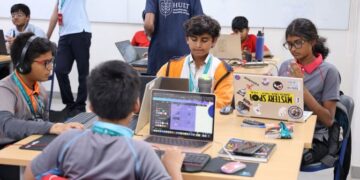OneStep Global, one of India’s leading organizations in global education consulting industry has taken a lead in fostering and accelerating international dialogue and cooperation by organizing Global Education Conclave 2023 in New Delhi. Spread over two days—Oct-27 &2 8, the conclave is taking place when world has started recognizing India’s immense potential for growth in sending out international students, academic collaboration, innovations, and research avenues, and is being attended by education experts, policymakers, and representatives from over 100 institutions worldwide.
The meticulously curated conference is discussing very relevant trends backed by reports and expert perspectives. The mobility of Indian students to educational institutions across the globe has been a subject of growing interest and scrutiny. And befitting to this curiosity and requirement, the conclave saw the release of a comprehensive report, ‘Beyond Beds & Boundaries: Indian Student Mobility Report, 2023’ by University Living.
In the inaugural plenary session an insightful panel discussion on ‘Unveiling India’s New Education Policy: Through a Global Lens’ Dr. Buddha Chandrasekhar, Chief Coordinating Officer & Head – NEAT Initiative at the All-India Council for Technical Education (AICTE) provided a panoramic view of India’s giant leap in enabling its education system to rise to its full potential through use of technologies. He said that India is changing and now education system is not producing students for working under someone but for solving problems and with a global mindset.
Prof. Indrani Bhaduri, Head Educational Survey Division and CEO, PARAKH – National Council of Educational Research and Training (NCERT) referred to competency-based transformation goal of school education to make Indian students comparable to international standards. Dipankar Chakraborty, Regional Director for South Asia and Middle East region – University of Birmingham shared his university experience with collaboration with IIT Madras where it is offering a joint master’s program in data science and AI.
The other topics being discussed in the conclave include:
- Navigating New Educational Terrain: How Global Governments Are Adapting to India’s Policy Changes.
- Leveraging India’s Academic Landscape: A Strategic Panel Discussion
- Understanding Trans National Education Partnerships: Challenges and Best Practices for Success.
- Unlocking Potential: The Vital Role of Student Counseling in Guiding Young Aspiring Minds Empowering
- Tomorrow’s Leaders: The Crucial Role and Comprehensive Support Provided by Global Institutions in Nurturing the Future Workforce
The highlight of the conclave, however, remains the Indian Student Mobility Report. This report is the second in the series that aims to dissect key education markets globally as the global student landscape is evolving, and Indian students are increasingly looking beyond borders for higher education. “We’ve focused on the journey of Indian students aspiring to study in the USA, Canada, Australia, and the UK. We estimated almost 8.5 lakh students are pursuing their higher education abroad in just the 4 focused countries – US, UK, Australia and Canada spending close to US$ 34bn in the year of 2023,” says the report authors. The report projects that by 2025, Indian students going abroad will touch 6,10,000 to these destinations and it will pip China in number of students going to USA. “Though the Government of India is doing all right things to expand the capacity of higher education intake, the reality is it is a time taking process and the 40 million students wanting to pursue higher education will go places. And that number is for this industry to flourish and move to provide value,” said Saurabh Arora.
The report reveals a significant increase in the number of Indian students choosing to study abroad. Traditionally Indian students have preferred countries like – US, Canada, UK and Australia. However, recently other countries have also emerged as preferred destinations, including Germany, Kyrgyzstan, Ireland, Singapore, Russia, Philippines, France, and New Zealand. Top States in India in terms of students going abroad include – Punjab (12.5%), Andhra Pradesh/Telangana (12.5%), Maharashtra (12.5%), Gujarat (8%), Delhi/NCR (8%), Tamil Nadu (8%), Karnataka (6%) and other (33%).
On expected lines, Canada was absent except for mention in the report. In Canada, Indian students (around 300,000) have an estimated total expenditure of US $11.7 billion, encompassing US $6 billion on academic fees, US $3 billion for accommodation, and US $2.7 billion on other living necessities.
The report also provides a detailed analysis of the financial aspects of studying abroad, shedding light on the substantial expenses incurred by Indian students. This analysis highlights not only the economic impact of Indian student mobility but also underscores the pressing need for targeted financial support and scholarships. Another significant highlight is the Student Housing Challenges faced by Indian students in finding suitable accommodation in their destination countries, emphasizing the complexities of securing appropriate living conditions and the necessity for streamlined processes and support services to alleviate these challenges.













